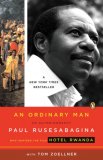Summary | Excerpt | Reading Guide | Reviews | Beyond the Book | Readalikes | Genres & Themes | Author Bio

Critics' Opinion:
Readers' Opinion:
First Published:
Apr 2006, 288 pages
Paperback:
Mar 2007, 224 pages
 Book Reviewed by:
Book Reviewed by:
BookBrowse Review Team
Buy This Book
All these things helped me during the genocide. But they
don’t explain everything.
Let me tell you what I think was the most important thing
of all.
I will never forget walking out of my house the first day of
the killings. There were people in the streets who I had known for seven years,
neighbors of mine who had come over to our place for our regular Sunday
cookouts. These people were wearing military uniforms that had been handed out
by the militia. They were holding machetes and were trying to get inside the
houses of those they knew to be Tutsi, those who had Tutsi relatives, or those
who refused to go along with the murders.
There was one man in particular whom I will call Peter,
though that is not his real name. He was a truck driver, about thirty years old,
with a young wife. The best word I can use to describe him is an American word:
cool. Peter was just a cool guy; so nice to children, very gentle, kind
of a kidder, but never mean with his humor. I saw him that morning wearing a
military uniform and holding a machete dripping in blood. Watching this happen
in my own neighborhood was like looking up at a blue summer sky and seeing it
suddenly turning to purple. The entire world had gone mad around me.
What had caused this to happen? Very simple: words.
The parents of these people had been told over and over again
that they were uglier and stupider than the Tutsis. They were told they would
never be as physically attractive or as capable of running the affairs of the
country. It was a poisonous stream of rhetoric designed to reinforce the power
of the elite. When the Hutus came to power they spoke evil words of their own,
fanning the old resentments, exciting the hysterical dark places in the heart.
The words put out by radio station announcers were a major
cause of the violence. There were explicit exhortations for ordinary citizens to
break into the homes of their neighbors and kill them where they stood. Those
commands that weren’t direct were phrased in code language that everybody
understood: "Cut the tall trees. Clean your neighborhood. Do your duty." The
names and addresses of targets were read over the air. If a person was able to
run away his position and direction of travel were broadcast and the crowd
followed the chase over the radio like a sports event.
The avalanche of words celebrating racial supremacy and
encouraging people to do their duty created an alternate reality in Rwanda for
those three months. It was an atmosphere where the insane was made to seem
normal and disagreement with the mob was fatal.
Rwanda was a failure on so many levels. It started as a
failure of the European colonists who exploited trivial differences for the sake
of a divide-and-rule strategy. It was the failure of Africa to get beyond its
ethnic divisions and form true coalition governments. It was a failure of
Western democracies to step in and avert the catastrophe when abundant evidence
was available. It was a failure of the United States for not calling a genocide
by its right name. It was the failure of the United Nations to live up to its
commitments as a peacemaking body.
All of these come down to a failure of words. And this is
what I want to tell you: Words are the most effective weapons of death in man’s
arsenal. But they can also be powerful tools of life. They may be the only ones.
Today I am convinced that the only thing that saved those
1,268 people in my hotel was words. Not the liquor, not money, not the UN. Just
ordinary words directed against the darkness. They are so important. I used
words in many ways during the genocide—to plead, intimidate, coax, cajole, and
negotiate. I was slippery and evasive when I needed to be. I acted friendly
toward despicable people. I put cartons of champagne into their car trunks. I
flattered them shamelessly. I said whatever I thought it would take to keep the
people in my hotel from being killed. I had no cause to advance, no ideology to
promote beyond that one simple goal. Those words were my connection to a saner
world, to life as it ought to be lived.
Copyright Paul Rusesabagina 2006. All rights reserved. No part of this book maybe reproduced without written permission from the publisher, Viking Press.





The Funeral Cryer by Wenyan Lu
Debut novelist Wenyan Lu brings us this witty yet profound story about one woman's midlife reawakening in contemporary rural China.
Your guide toexceptional books
BookBrowse seeks out and recommends the best in contemporary fiction and nonfiction—books that not only engage and entertain but also deepen our understanding of ourselves and the world around us.